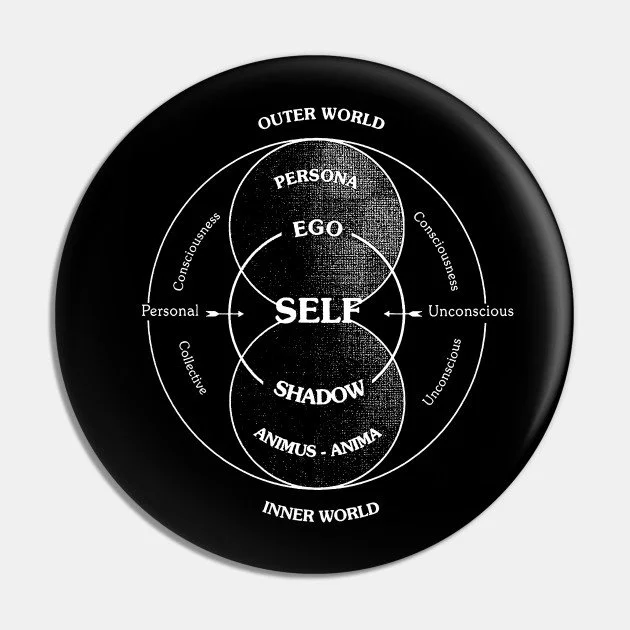Embody Your Shadow and Watch Your Life Bloom
Alright, picture this: You're on a journey of self-discovery, but it's like wandering into a mysterious forest within your mind. You're facing the stuff you've tucked away in your psychological attic—the shadows, the quirks, the awkward dances of your thoughts. We call this experience 'Shadow Work,' and it's like spelunking through your own head. Sound wild? Let's break it down.
So, there's this psychology wizard named Carl Jung. He cooked up a model of the mind with layers—like an onion of thoughts. There's the conscious part you're aware of, the unconscious lurking in the shadows, and then, ta-da, the 'shadow' part.
*From The Shadow Work Journal Second Edition
No, it's not a ghost, but it's where all the stuff you're not really showing off hides. Desires, fears, you name it. It's like the basement of your brain.
And this ain't just philosophical pondering—it's a full-blown quest. We're digging out those mental fossils, those old feelings and funky beliefs that have been gathering dust. You know those 'a-ha' moments? That's the lightbulb flickering above your mental attic. It's about acknowledging the not-so-shiny bits and making peace with them. Our brain's a sneaky rascal. It's got these biases like a GPS sending you off-course. There's one that only lets you see what you already agree with—like a stubborn GPS that only takes you to your favorite pizza place. Another bias makes you cling to old ideas, even if they're as outdated as a cassette tape. And there's the one that tricks you into thinking you're a genius even when you're still a student of life.
Sometimes this journey feels like climbing a mental mountain range. You got Declinism, making you think everything was better 'back in the day.' You know, those times when life seemed simpler, better, and more perfect than the present. It's like our brain's wearing nostalgia-tinted glasses, painting the past in rosy hues while making the present look like a rainy day.
But here's the catch: Declinism isn't the real deal. It's a mental illusion, a cognitive bias that messes with our perception. When we look back, we often remember the highlights – the laughter, the achievements, the triumphs. The boring, stressful, or mundane parts? Well, they tend to fade into the background, like extras in a movie.
So, as we tread the path of Shadow Work, it's essential to recognize declinism's illusions. It's not about dismissing the past's beauty, but about acknowledging that life's a kaleidoscope of experiences, each with its own shade. The past wasn't entirely sunnier, and the present holds its own gems.
Then there's the framing effect, changing your mind based on how stuff's presented. Ever felt like someone's rearranging the puzzle pieces of reality? That's the framing effect in action. It's like Jesse Eisenberg in that magician movie manipulating our perceptions, making us see the same situation differently based on how it's presented. It's the difference between seeing a glass as half-empty or half-full. Honestly, though, I say shatter that glass and just enjoy the water.
We're choosing to see the forest rather than the trees and framing our narrative. Frank Herbert has one of my most coveted quotes in his masterpiece ‘Dune’, “Life is not a problem to be solved, but a reality to be experienced”.
Now the Negativity Bias—a brain glitch that has us dwelling on the bad stuff. It's like rewinding a horror movie scene over and over. But guess what? We're rewiring the brain remote. We're hitting the 'positivity' button, too. Now, you might wonder, "Why does my brain do this to me?" Well, it's all about survival. Back in the day, when we were dodging saber-toothed tigers, remembering the bad stuff was crucial for staying alive. But in today's world of social media and constant news updates, this bias can be a bit dramatic. Here's the silver lining: We can train our brains to embrace a more balanced perspective. It's like giving that drama queen a reality check. When negativity looms large, we can intentionally shine the spotlight on positive experiences, accomplishments, and even the simple joys of life.
Imagine you're your own best freaking friend. Self-compassion is giving yourself a virtual hug when you face the not-so-sunshiney stuff. And guess what? It's okay to struggle. You're like a plant growing in the dark. Grounding techniques? They're like plant food and sunlight for your mind.
You might regret getting me started on triggers and patterns. Triggers are like mental breadcrumbs leading you to hidden treasure—your unresolved stuff. Finding these breadcrumbs is like detective work with emotional magnifying glasses. And patterns? They're like your mind's favorite song on repeat. Once you catch onto these hits, you're one step closer to owning the concert stage of your life.
Projection? It's like your brain's own movie theater, playing films from your own psyche. You're watching a movie, but the plot twists reveal stuff about you that even you didn't know. It's an ego-mirror trick, and boy, is it revealing.
Remember that dance between your conscious and unconscious minds? It's like getting your thoughts to do the tango. They're often on different tracks, but we're going full GoTanks fusion on’em. It's all about uniting your 'know it all' side and your 'hidden gems' side. The result? More growth than a garden with a copper wire.
So, here's the gist of things: Shadow Work isn't just a journey—it's a safari into your own wild mental terrain. You're the explorer, facing off with your inner lions and tigers. You've got this. Armed with insights, tools, and a sense of humor, you're turning this safari into a masterpiece—a painting of self-discovery.

